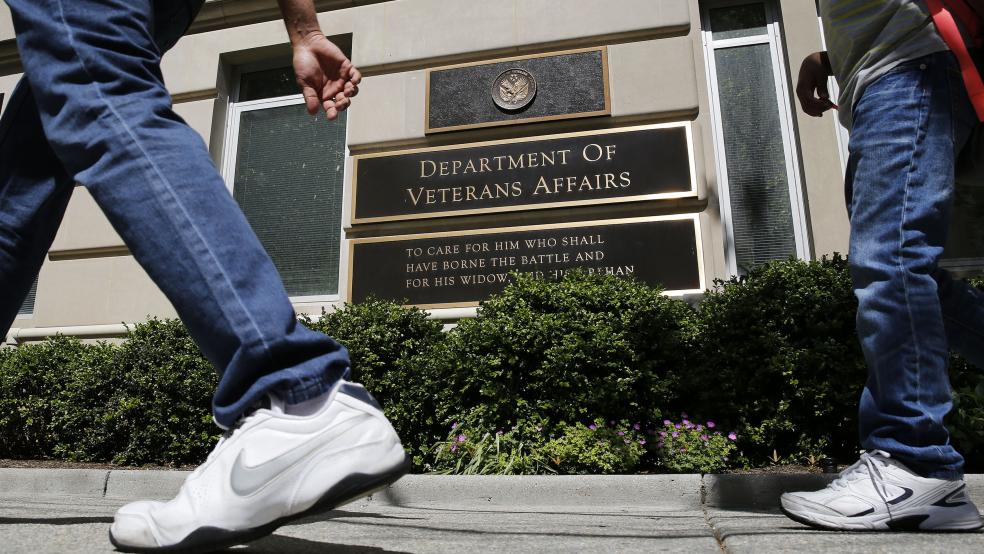When lawmakers head to conference to try to reform the embattled Veterans Affairs health care system, they will consider a Senate-passed measure that includes authorizing $200 million to lease additional medical facilities to alleviate the backlog of veterans waiting for treatment.
The problem is the VA has recently come under scrutiny for mismanaging a large portion of the leases it already holds—leading to delays in opening medical centers across the country.
Related: VA Scandal Gives Single-Payer Opponents Ammunition
A report from the Government Accountability Office shows that 39 of 41 leasing projects reviewed—worth a total of $2.5 billion—experienced delays ranging from 6 months to 13 years.
The average medical facility was delayed by three years—a significant amount of time for an agency that says its massive backlogs and wait lists are a result of underfunding.
Lorelei St. James, Director of the GAO’s Physical Infrastructure Team for said the issues with the leases tend to occur in the beginning stages of the projects.
“Ninety-five percent of the issues happened in the initial first steps. VA didn’t coordinate what was needed and the projects almost always exceeded the initial costs submitted,” she explained.
In GAO’s report, auditors said the agency often provided project requirements late or used outdated guidance. Costs increased for all 31-lease projects for which the VA had complete cost data.
First-year rents increased a total of $34.5 million—an annual cost that will extend for 20 years---or the life of the leases, the report said.
Related: Obama Sticks to Scandal Playbook in VA Mess
The Senate’s bill, approved last week, would authorize $200 million over 10 years for 26 new leases. Meanwhile, a House bill approved late last year approved 27 new leases for medical facilities.
St. James said if the leases are approved, the Veterans Affairs Department should better coordinate the first steps of the leasing projects, and take up recommendations made by GAO for the other projects.
In the report, GAO said the VA should update its guidance for leasing outpatient clinics.
“We would hope they wouldn’t have similar problems with the new leases if they’re approved,” St. James said. She added that The VA should take up the GAO’s recommendations to prevent any more cost overruns or delays to the projects with future leases.
The new leases are just one of a handful of proposals that have been offered to overhaul the VA’s health care system.
The Senate bill approved last week would also give the VA greater authority to fire senior executives and provide additional funding for the agency to contract with private medical centers to help curb backlog. It also expands access to health care for military sexual-assault survivors and requires colleges and universities to offer in state tuition to all veterans regardless of where they live.
The Congressional Budget Office estimates that the Senate bill would cost an additional $50 billion a year. The White House said it “strongly supports” the Senate bill, which will be considered in the conference committee.
The House passed a similar bill, which also requires the VA to pay for outside medical care for service members if wait times are too long. And it also makes it easier for the VA Secretary to fire or demote agency officials. The most recent House bill does not include additional leases for medical centers.
The House and Senate negotiators are expected to begin working to reconcile the different bills to reform the VA, but the current legislation offered faces strong opposition from budget hawks who say it costs too much.
The Committee for a Responsible Federal Budget, a bipartisan nonprofit group, issued a statement saying both the House and Senate bill provide a "blank check to the VA, violate every principle of good budgeting, and could add substantially to the national debt."
“As the House and Senate prepare to go to conference on the VA bills, we hope they find ways to efficiently target expanded benefits, and we especially hope they propose paying for any new costs,” CRFB said. “More importantly, we believe the conference committee should ensure new funding levels are set either by the appropriators, by the legislation itself (through a capped mandatory appropriation), or preferably by both (a fixed discretionary authorization); not by offering the VA a blank check.”
Top Reads from The Fiscal Times:





